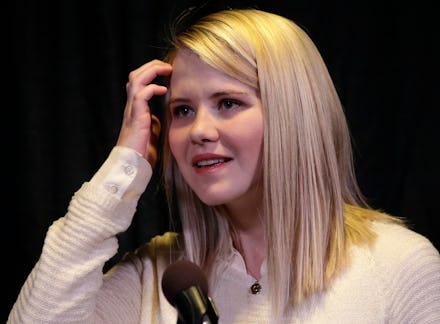Elizabeth Smart says porn made her sexual assault worse — is she right?

In 2002, when she was 14, Elizabeth Smart was kidnapped from her bedroom in Utah. Over the next nine months, Smart was repeatedly raped by her abductor, drifter Brian David Mitchell until March 2003, when she was rescued by someone who recognized her on a Utah street.
Since then, Smart has become an ardent advocate for sexual assault survivors' rights. She has also, apparently, become an advocate for another cause, which she spoke out against last Friday: the anti-porn movement.
In a recent video for Fight the New Drug, a grassroots organization dedicated to battling the scourge of porn addiction, Smart spoke out about the role porn played in her abuse. She recounted one time that Mitchell forced her to look at a hardcore porn magazine and reenact the scenes in the photos.
"It just led to him raping me more, more than he already did, which was a lot" she said. "Looking at pornography wasn't enough for him. Having sex with his wife after looking at pornography wasn't enough for him. And then it led to him finally going out and kidnapping me. He always wanted more."
Smart is careful to note that she can't say for sure whether Mitchell would have kidnapped and raped her had he not viewed pornography. "All I know," she says, "is that pornography made my living hell worse."
As a kidnapping and sexual assault victim, Smart has obviously gone through hell, and there's obviously no benefit to disputing the details of her story. It's also worth commending Smart for the fact that she chose to open up about an experience that, while sadly all too common, is often shrouded in silence.
Yet Smart's message is not a new one. There are numerous organizations like Fight the New Drug claiming that excessive pornography consumption — or even any pornography consumption at all — leads to porn addiction, or, even worse, the exacerbation of violent sexual urges. Which is why it's worth interrogating Smart's claim that porn aggravated her abuser's violent sexual urges — as well as her choice of platform for spreading that message.
The thing is, there's very little research to corroborate the link between violent porn and whether or not someone will actually commit a violent sexual offense IRL. In fact, there's some evidence to suggest that online pornography is actually contributing to an overall decline in sexual assault rates, in part because it can serve as an outlet for violent sexual desires.
In a 2006 paper presented at Stanford Law School, economist Todd Kendall found that states where internet access had increased the fastest saw a 7.3.% reduction in the number of reported rapes. While that decline can probably be attributed to a number of different factors – such as increased educational initiaties, or federal funding for anti-rape legislation — it's not so bonkers to assume that if you're the type of person who has frequent rape fantasies, having access to staged digital depictions of said fantasies will make it less likely for you to act on them IRL.
That's not to say that hardcore porn clips featuring rape-y themes aren't extremely common on the internet, or that such content isn't disturbing — it is, and it can be. But there simply isn't enough legitimate, unbiased research on the topic to definitively conclude that watching too much hardcore porn can cause harm to yourself and others — and those who make such claims usually have an agenda.
Take, for instance, Fight the New Drug, the organization that Smart partnered with to release her statement. Although FTND is ostensibly a secular organization that purports to use "science" to fight porn addiction, many of its leaders are members of the Church of Latter Day Saints, which takes a strong anti-pornography stance. (Smart herself is also a member of the church.)
FTND does cite scientific evidence from neuroscience researchers that watching too much porn can trigger deleterious changes in the brain. Yet as the Daily Beast reported in 2015, FTND's director of research is an anti-gay activist and a professor of "Marriage and Family Studies" at the Mormon-owned Brigham Young University — hardly an objective authority on the science of porn addiction.
Further, much previously cited research suggesting the negative effects of pornography use is tinged with religious bias — and there's an emerging body of evidence suggesting that porn use doesn't actually trigger harmful changes in the brain at all.
Dr. Nicole Prause, a UCLA researcher who has debunked the concept of porn addiction, told the Daily Dot in 2014 that watching porn triggers a reward response in the brain, similar to that prompted by eating a piece of chocolate or rooting for your favorite baseball team. "Any preferred stimulus, you're going to show an increased reward response, and that is not any evidence of addiction," Prause said.
No one can tell Elizabeth Smart anything about what she experienced during those horrifying nine months with her captors. If it expedites her healing process to attribute her abuse at least in part to the effects of hardcore pornography, then so much the better for her.
Yet for an anti-porn organization to trot Smart out and have her claim that pornography is inextricably linked to sexual assault does not just do those who regularly watch pornography (an estimated 77% of young men and 55% of women, according to studies) a disservice — it does sexual assault survivors like Smart a disservice, too. Because when it comes down to it, as wont as we are to use porn as a scapegoat for all of our societal ills, there's only one thing driving men like Mitchell to sexually assault girls and women: themselves.